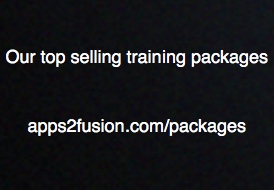This tutorial deals with Fusion Payroll, and how it functions. In this part, we will discuss about Payment Methods in Payroll.
Payment Methods
Once the components of Payroll like balances, earnings and deductions, etc. are set up, there has to be a mechanism by which the actual payment takes place for the Payroll.
Payment Methods are the definition of how the payments are handled through organisations and employees.
There are three types of payment methods:
-
Organisation Payment Methods - related to payments with the organisation.
-
Personal Payment Methods - related to the employees.
-
Third Party Payment Methods - related to payments to third parties that do business with the organisation.
The Payment Distribution Mechanism varies depending on the country in which the organisation is operating. There are three types of payment distribution mechanisms:
-
Electronic Fund Transfer (EFT)
-
Check
-
Cash
Organisation Payment Methods
It is the definition of how the payments are handled from the organisation’s perspective. At least one Organisation Payment Method has to be defined for each combination of the Legislative Data Group, Payment Type, and Currency that you use to distribute the wages and other compensations.
The payment types available for an organisation Payment Method are: Electronic Fund Transfer, Check, and Cash.
For any payment method through Electronic Fund Transfer (EFT), a bank account has to be set up in Payroll initially (for instructions, please see the tutorial on Accounts and Bank Setup).
For Payroll processing, at least one payment source has to be defined for each organisation payment method. This can be a bank account or any other source of funds. In Oracle Fusion Cash Management, it is associated with an active bank account.
For multiple payment sources, payment rules are used to determine the appropriate payment source based on the tax reporting unit (TRU).
The task associated with it is Manage Organisation Payment Methods.
Personal Payment Methods
It is the definition of how the payments are handled from the employee’s perspective (those within the organisation).
If an employee does not have a bank account, then a personal payment method has to be attached to him/her, and it is usually either Check or Cash.
A Personal Payment Method can be created only when the Payroll is assigned to a person and valid payment methods are assigned to the Payroll. It is possible to assign multiple Personal Payment Methods for a single person. For example, an employee can be assigned two personal payment methods as follows: 50% of his/her payment through EFT (a bank account is required for this) and the other 50% through Check.
In case a personal payment method is not assigned to an employee, the Default Payment Method that is provided at the time of Payroll Definition will be utilised for that employee.
An important aspect of the personal payment method is that it has to be associated with an organisation payment method in order to specify the payment source. As with the organisation payment method, a bank account is required for EFT payment.
Other aspects are:
-
Processing Order - in the case of multiple payment methods, the order in which those methods have to be processed is to be specified
-
Amount Type - the type of payment to be done
-
Amount - the actual amount of payment
The task associated with it is Manage Personal Payment Methods.
Third Party Payment Methods
It is the definition of how the payments relating to external organisations and people who are not on the Payroll are handled. Third parties can include suppliers, professionals, or organisations that are hired by the organisation for their products and/or services.
When Third Parties are created, corresponding records for them are created as trading community members in the trading community application. Third parties can either be persons (individuals) or organisations:
-
Third Party Persons - the application automatically assigns a party usage code for the External Payee
-
Third Party Organisations - you assign a party usage code specifying whether it is a Pension Provider, a Professional Body, or simply an External Payee.
After creating the required third parties, payment methods can be created for the third parties so that they can be utilised in Payroll processing.
When creating a Third Party Payment Method for an organisation, an Organisation Payment Method has to be provided. For a Third Party Payment Method to a third party person, an Organisation Payment Method has to be provided along with the relationship with any employee within the organisation.
A bank account is needed if the Payroll Organisation Payment Method is EFT.
Payment methods are associated with the Payment Distribution Work Area. The task associated with it is Manage Third Party Payment Methods.
Fig. 1 - The Payroll Distribution Work Area



